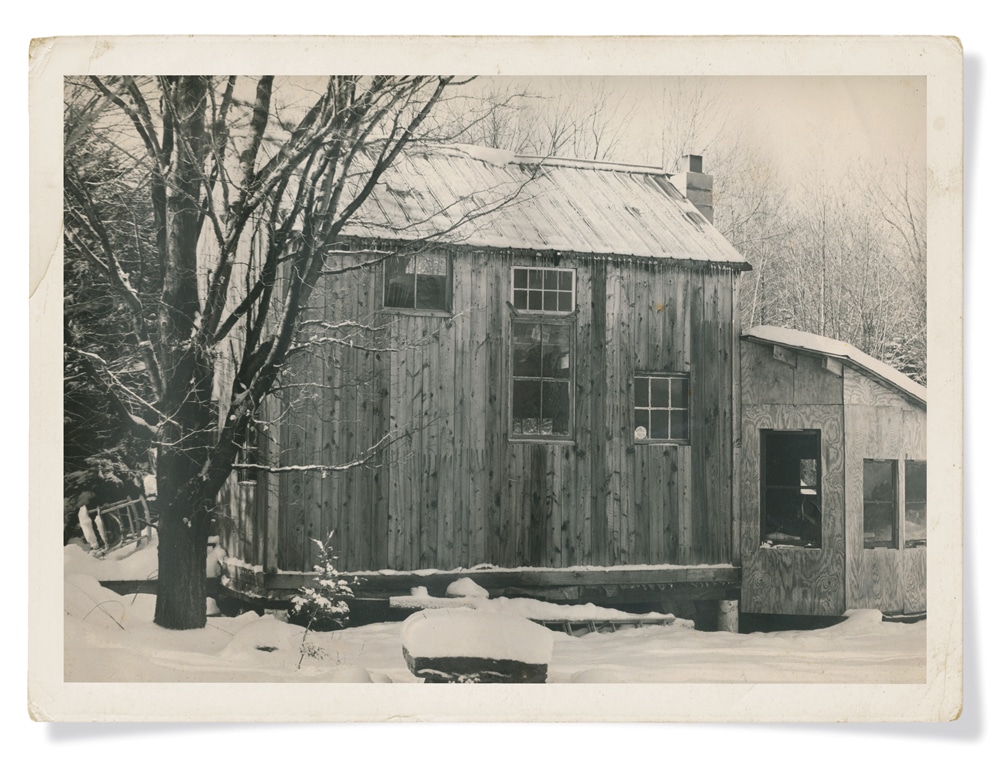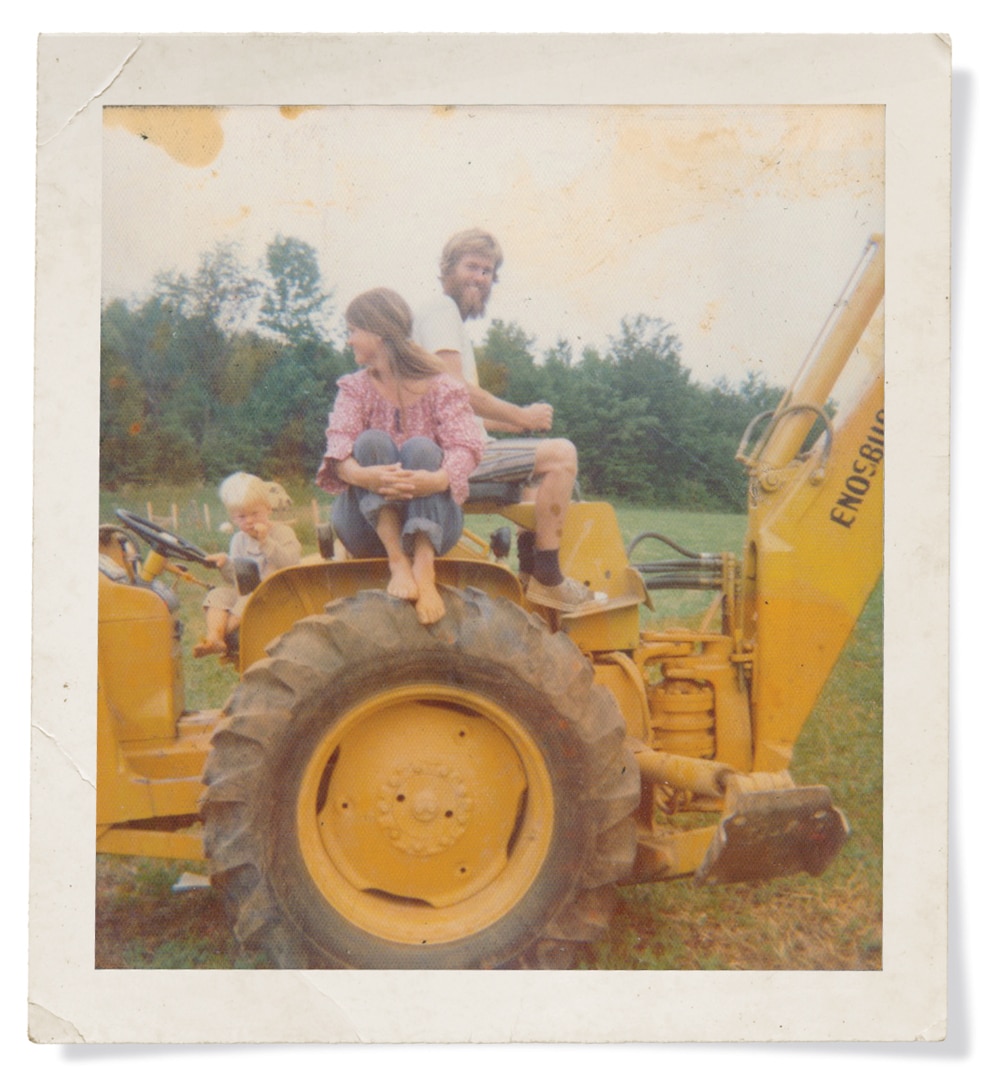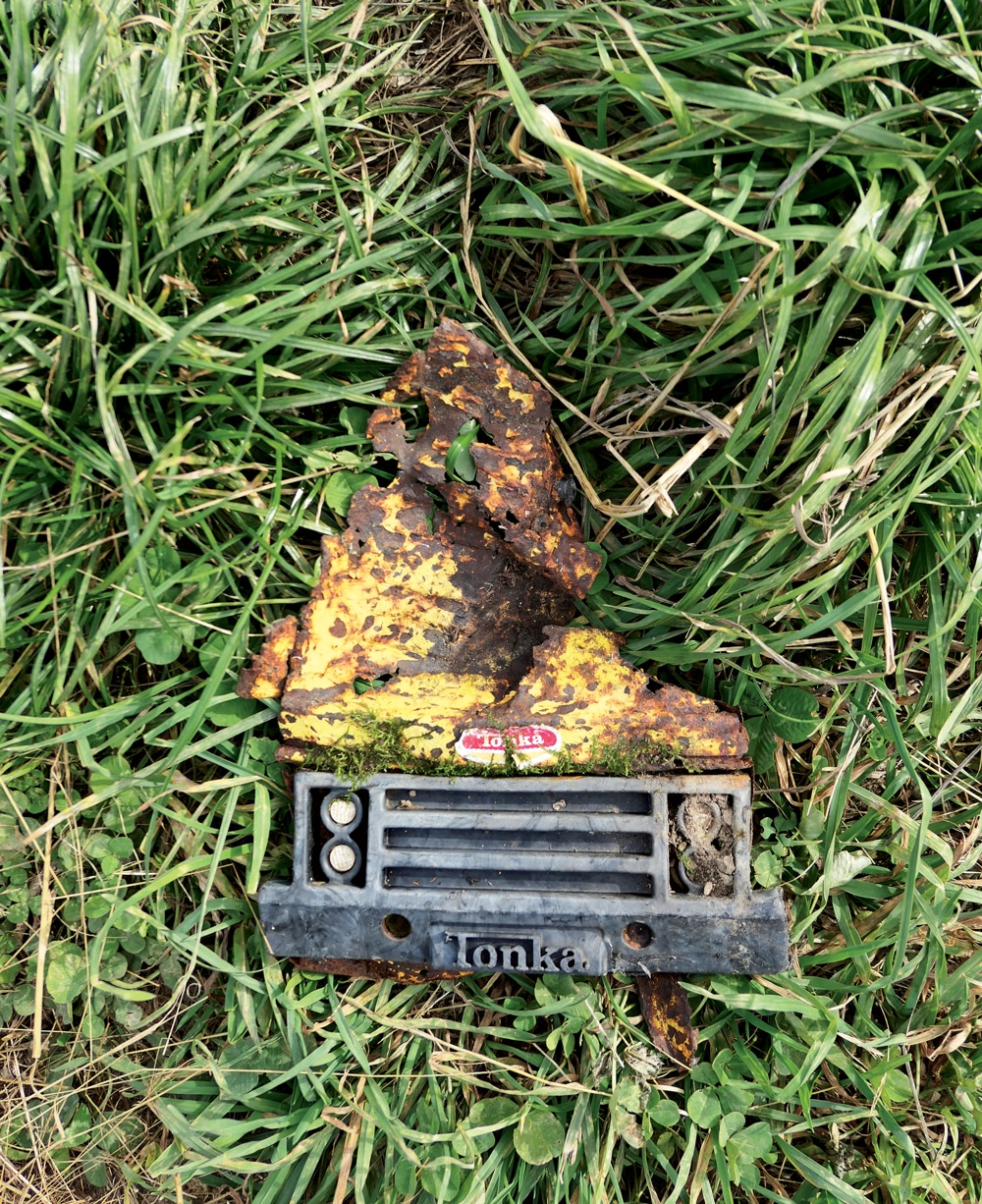The Memory House | Life in the Kingdom
A father-and-son camping trip to a long-ago family homestead stirs up the past.

Shown as it looked
when nearly complete,
back in the 1970s,
this homespun cabin built by the author’s parents still stands on the family land in Enosburg, Vermont—though the years have taken their toll.
When my father was 26, he came to northwestern Vermont from the suburbs of New Jersey. With $10,000 he’d inherited from his father, plus another $7,000 borrowed from the bank, he purchased 165 acres and an old farmhouse. The land and house were nestled at the bottom of a bowl formed by the Cold Hollow Mountains, a string of peaks that compose the northernmost tip of the Green Mountain range.
A couple of years later, my mother showed up. She’d been raised on an Iowa corn and soy farm, graduated from Grinnell College (also in Iowa), and thereafter spent her 20s in the throes of wanderlust. Which is how she ended up on my father’s doorstep—he’d earned a reputation for sheltering itinerant travelers, and she needed a place to stay. It turned into a somewhat longer and more complicated visit than anticipated.
I was born in 1971, in the hospital of the nearby town of St. Albans. I spent the first year and a half of my life in that drafty farmhouse, while my parents worked to complete a two-room cabin at the height of a hayfield just to the east (the house, served as it was by electricity and indoor plumbing, was evidently too commodious for their tastes).

Photo Credit : courtesy of Ben Hewitt
During this period, my father wrote and taught poetry and edited poetry anthologies. My mother cared for me and rode her bike to a farm a mile up the road, where she milked a herd of cows. Together, my parents tended a large garden, kept a flock of laying hens, and for a time husbanded a pair of pigs my uncle brought them as a surprise. In the summer, we cooked outside over an open fire; in the winter, we cooked indoors on a wood stove.

Photo Credit : courtesy of Ben Hewitt
I do not remember much about this period of my life apart from what I’m told. I do remember that my mother had a dog named Art, and that Art died at some point during our time in the cabin, and that she buried him in the woods. I remember riding my big wheel in the swath of mown grass behind my father’s reel mower, and I remember playing in an old van parked at the side of the dirt track leading from the town road to the cabin. Or maybe it was a pickup truck. I remember visiting friends who lived a couple of miles down the road—two sisters, I’m pretty sure—and thinking their house impossibly grand, though I’m sure it was only so grand in comparison with ours. What memories I have of this time do not strike me as favorable or unfavorable; they’re neither good nor bad. I suspect this is merely a reflection of how children experience the world, the quiet acceptance that life is just what it is. It’s only later that we get picky.
We moved from the cabin when I was 6. My father had taken a job in Montpelier, an hour and a half to the south, and the commute became untenable. My parents rented a cavernous old country inn about 10 miles north of Montpelier. We packed up our modest collection of belongings and left the cabin behind. I sometimes wonder what this transition was like for me. I’d spent the majority of my young life living in two rooms, eating meals cooked over a fire, being read to by the light of a kerosene lantern, and going to the bathroom outdoors. Suddenly, there were light switches everywhere and flush toilets on every floor. For a brief period, following relentless lobbying on my part, we even owned a television, though it soon quit working. I again applied what pressure I could, but the set was never replaced.
Last fall, during bowhunting season, my son Rye and I returned to my childhood home. I’d visited the property only a handful of times since leaving it; the most recent had been nearly a decade earlier, to show Rye and his brother, Fin, where I’d spent my early years. That visit had been brief: We’d walked up the hill, poked around the cabin, and departed.
This time, Rye and I planned to camp on the land for three nights. He and my wife, Penny, had scouted it a week earlier, and he’d found a likely spot for a tree stand at the edge of a just-harvested corn field (my parents lease the open land to a neighboring dairy farmer—indeed, the same farmer my mother had once milked for). Since I don’t bowhunt, I’d filled my pack with books and a pair of hiking boots, for I intended to explore the land far beyond the few-hundred-foot circumference that forms the basis for my handful of memories.
We’d been in the midst of a late-season warm spell, with day after day of brilliant sunshine and temperatures well into the 70s. And while it’s been my experience that the outset of camping trips frequently coincides with the demise of placid weather, such was not the case here. Furthermore, I was surprised to find that the foliage in Cold Hollow was still near peak; back home the hillsides had turned to gray, with only the birch and the beech stubbornly clinging to their yellowed leaves, all the more stunning against the backdrop of exposed branch and trunk.
Rye and I situated our tent under a canopy of sugar maples, on one of the few flat spots we could find, about 100 yards west of the cabin. We unrolled our sleeping pads and unstuffed our bags. Because Rye believes that part of the appeal of camping is to make do with less than one is accustomed to, he did not bring a pillow. Because I believe that part of the appeal of camping is to artfully re-create the comforts of home in the wild, I’d packed two pillows: one for my head and, because I sleep on my side, one for between my legs, to protect the inner knobs of my knees from bumping each other in the night (the boys, who know this habit of mine, have endearingly taken to calling this my “crotch pillow”).
With camp established, we embarked on a ramble, meandering through the woods toward the rear boundary. This was new terrain to me—or, at the very least, forgotten terrain. The forest remained primarily hardwood for a few hundred yards; then we began descending from the height of the land, and the trees slowly shifted to coniferous species, with hemlock presiding. But even among the hemlocks we came across the odd maple with a rusted sap bucket still hanging, and I wondered if these had been left by my parents, or maybe even a previous landowner. I tried to lift one off its tap, but it would not budge, and upon closer inspection I realized that the tree had actually grown around and over the rim of the bucket, almost as if it were consuming the metal.
That night, we cooked T-bone steaks over the fire and ate them directly from the greased pan, using the bones as handles for the attached meat. (This may seem counter to my earlier claim of wanting to re-create the comforts of home in the wild, but the unflattering truth is that this is how I prefer to eat my steak at home, too.) I’d wrapped potatoes in tinfoil and placed them in the coals, but my timing was off, and the potatoes were still hard long after the steaks were gone, and we left them to finish cooking amid the dying embers. They’d be a fine start to breakfast. By 8:30, we were asleep.
The next morning, we explored the cabin, which had not fared well in the absence of human habitation. Every window bore at least one pane of broken glass, and in spots the floor was so visibly compromised I dared not place my full weight atop it. As we walked through the cabin, a series of images ran through my mind: There was my father in his chair, by the old cookstove (though the stove itself was outside, rusting into the ground), smoking a Lucky Strike. There was me, lying in my bed beneath the window that was hinged at the top, and which my mother has told me came crashing down once, the glass shattering across my supine, slumbering body; I never woke up, as the story goes, and my mother picked the glass off me as I slept. And there was my mother, reaching into the little insulated cold box built into the floor, extracting a carton of milk. I could not discern whether these images were real or imagined, but it didn’t much matter, because I knew they represented something real, and that even if the exact image of my father sitting by the fire or my mother reaching into the cold box wasn’t perfectly accurate, these things happened.
Later that day, after Rye had gone to his tree stand for his evening sit, and after I had gotten the fire going in order to cook another one-pot meal, I spent some time poking around the woods surrounding the cabin. There, I uncovered an old engine (from a rototiller, I decided), a bedspring, the business end of a spade, and a few more sap buckets—nothing surprising, nothing of any real consequence. And just as I was about to return to the fire, I spied something yellow at the base of a maple. A leaf, I figured, or a pile of leaves, and I almost passed it by, but something compelled me to investigate further. And there I found the front end of an old Tonka truck, the edges rough and rusted, the body having long since returned to the earth.

Photo Credit : courtesy of Ben Hewitt
I picked it up and held it in my hands, willing an image to come. I knew I’d played with that truck, taken it into the woods, carried rocks and sticks in its bed, made rumbling noises with my mouth. But it had been four decades or more since I’d last held that truck, and in this case, at least, I couldn’t see that far into the past.


